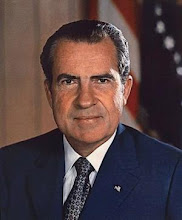Richard Milhous Nixon:
- Born in Yorba Linda, California on January 9, 1913
- Graduated from Duke University School of Law in 1937
- Practiced law in Habra, California until 1941
- After the attack on Pearl Harbor he joined the US Navy in the Pacific and rose to the rank of Lieutenant Commander.
- 1946 was elected as Californian Republican in the House of Representatives
- 1950 he was elected into US Senate
- 1952 he was Dwight D. Eisenhower's running mate and became the youngest Vice President in history at the age of 39
- 1960 he ran a presidential campaign against JFK and lost
- 1962 he lost his campaign for Governor of California
- 1962 he withdrew from political life in which he said to the press "You won't have to kick Nixon around anymore."
- 1968 Nixon ran for President and was elected as the 37th President in US history










